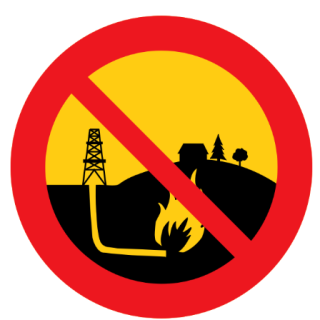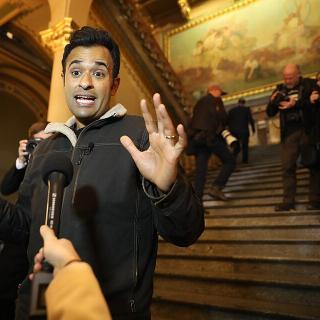Activists call on oil and gas commission to seek emergency rule regarding extraction on public lands
Environmental activists, after Wednesday’s public meeting (March 1st) of the Oil and Gas Land Management Commission, called on commission members to seek emergency adoption from Gov. Mike DeWine of Proposed Rule 155-1-01, which sets the regulations regarding oil and gas industry leases for fossil fuel extraction from Ohio public lands.
The Oil and Gas Land Management Commission approved Proposed Rule 155-1-01, along with a draft Standard Lease Form, at its February 1 meeting and sent these items on for consideration by the Common Sense Initiative and Joint Committee on Agency Rule Review.
These meetings follow the passage of HB 507, signed into law by Gov. DeWine on January 6. HB 507 forces any state agency, which owns a parcel of public land, to allow the oil and gas industry to extract from its public land.
The normal process of approving a draft agency rule can take months, but if Proposed Rule 155-1-02 is not in place by April 7, when HB 507 goes into effect, then oil and gas corporations will be able to bypass the commission and go directly to state agencies to request extraction on public lands – and the agencies will be compelled to allow it.
Under Revised Code 119.03(G), an agency may ask the governor for an emergency adoption of a rule if the rule will ensure the health, safety, or welfare of the state. The health, safety and welfare of Ohio is best served by putting one commission in charge of decisions about oil and gas extraction on public lands, rather than compelling state agencies to approve such requests.
Surface Impacts discrepancy
When Governor DeWine signed HB 507 on January 6, he issued a statement banning any direct surface impacts such as well pads, pipelines, or access roads in state parks.
“I am instructing the Director of the Department of Natural Resources to continue to follow the processes first established by the General Assembly in 2011 in this area. This includes continuing my administration’s policy of prohibiting any new surface use access in our state parks,” DeWine said.
Yet the draft Standard Lease Form extensively discusses surface impacts on public lands, stating they are allowed through a separate written surface use agreement signed between the state agency and the oil and gas company approved to extract on public land.
Such a separate written agreement would allow for the following on public land, including state parks and state forests:
- Well pads or well sites
- Equipment, facilities, and structures such as pipelines, pump stations, tank batteries, dryers, pipelines, separators, or compressors
- Access roads
- Temporary or permanent pits
- Activities and operations
Critically, these separate written agreements would occur after the commission decides to approve an oil and gas lease. Surface impacts of oil and gas extraction on public land would not come back before the commission or be subject to any public notification or comment.
This does not follow Ohio Revised Code 155.33(B)(1)(h), which states that the commission must take into account “any comments or objections to the nomination submitted to the commission by residents of this state or other users of the parcel of land that is the subject of the nomination.”
It is not possible for citizens to provide informed comments and objections if they do not know what is being proposed on a parcel of land – especially one as important as an Ohio state park or forest. Ohioans own our state’s public land and deserve an informed say in how it is used.
Inability to speak
Just as disturbing, despite the requirements of Ohio law and promises of commission members at the February 1 meeting, environmental activists were not allowed to speak during the March 1 meeting of the Oil and Gas Land Management Commission.
The meeting agenda includes a presentation about the Muskingum Watershed Conservancy District, where members of our group live and have experienced the negative effects of fracking first hand. Yet they will not be allowed to speak to their experience that bears directly on the topic being discussed at the meeting.
Suppressing speech by tax-paying Ohioans who own our public lands and have directly experienced the negative effects of oil and gas extraction is not how to run a public meeting in Ohio. We deserve better, and the commission simply must do better.



